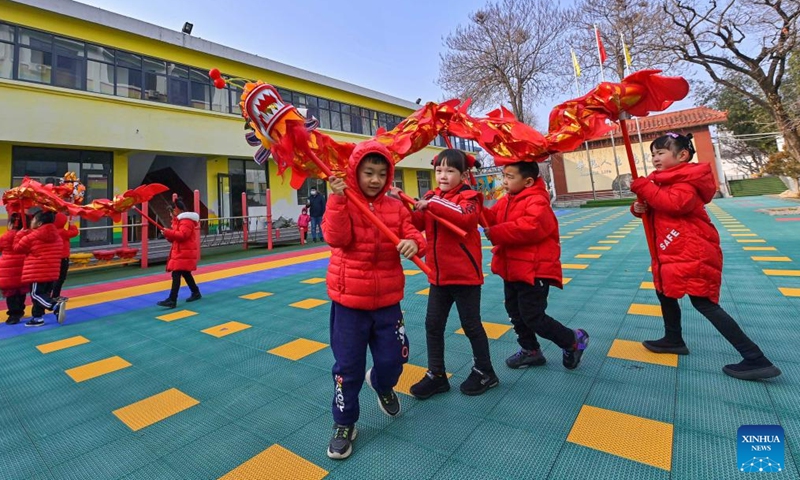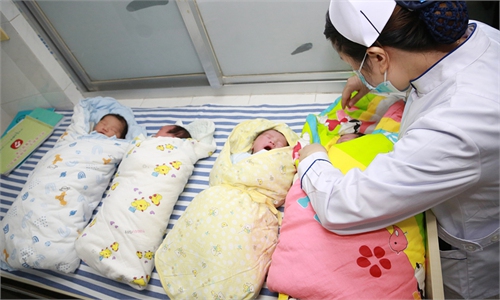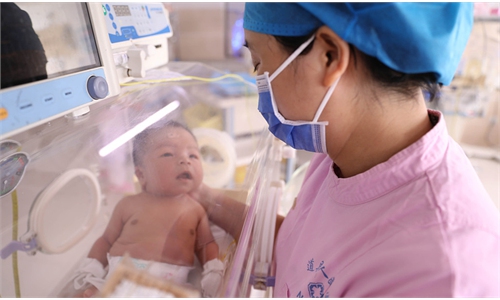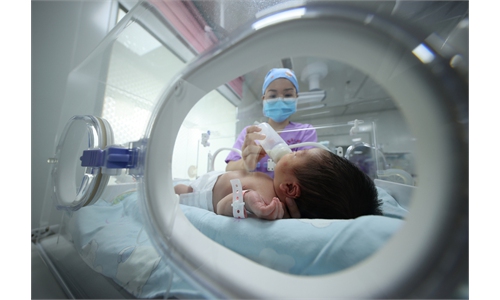Cost of raising a child until age 18 in China 6.9 times China's GDP per capita, higher than US, France and Germany: report
Nation needs to spend 5% of GDP annually to lift fertility rate to level of developed countries: economist

Kindergarten children play dragon dance to celebrate the Lantern Festival in Qingzhou City, east China's Shandong Province, Feb. 15, 2022.Photo:Xinhua
The average cost of raising a child until the age of 18 was 485,000 yuan ($76,556) in China in 2019, which was 6.9 times China's GDP per capita, much higher than many countries including the US, France, Germany and Japan, according to a new report released on Tuesday.
The report estimated that China needs to spend 5 percent of its GDP annually to lower the costs of raising children to the level of developed countries.
In 2019, the average cost of raising a child from birth to the age of 18 was 485,000 yuan in China. With a GDP per capita in 2019 of 70,300 yuan, the cost of raising a child was rounded up to 6.9 times China's 2019 GDP per capita, according to a report published on Tuesday by the YuWa Population Research think tank. The think tank was established by a group of demographers and economists, including economics professor at Peking University Liang Jianzhang.
The report compared the figures with 13 other countries in Europe, Asia and America, showing China ranked the second among all these countries in expenditure of raising a child to the age of 18. South Korea ranked first with 7.79 times of its GDP per capita being spent on raising a child until age 18. South Korea's fertility rate is now the lowest in the world, which was 0.84 in 2020.
The cost of raising a child from birth to age 18 in the US was 4.11 times its GDP per capita in 2015, and in the UK it was 5.25 times its GDP per capita in 2021 and 3.64 times of Germany's GDP per capita in 2018.
The report also estimated the costs of raising children in urban cities and remote areas in China based on household income and consumption expenditure released by the National Bureau of Statistics.
The report said the average cost for Chinese urban families raising a child until the age of 18 is 630,000 yuan, but the average cost for rural families is 300,000 yuan.
For different provinces and cities, Shanghai ranks the first among all cities in Chinese mainland with the average cost reaching 1.03 million yuan, followed by Beijing with 969,000 yuan. In comparison, families in Southwest China's Xizang (Tibet) Autonomous Region spend an average of 293,000 yuan to raise a child until the age of 18.
Urban families spend an average of 631,000 yuan raising the first child until age 18, urban families with two children spend an average of 497,000 yuan for each child until age 18, and urban families with three children spend 377,000 yuan for each child, the report said.
The report said that the high cost of raising children is one of the main factors preventing couples of childbearing ages to consider having a child.
Yang Jinrui, an official with the National Health Commission, said at a press conference on January 20 that young people's desire to have children continues to decline, with women of childbearing age planning to have 1.76 children on average in 2017, 1.73 in 2019 and 1.64 in 2021.
Meanwhile, a total of 8.14 million marriages were registered in 2020, 1.13 million fewer than in 2019. This is the seventh consecutive year of decline since 2013.
With the number of newborns standing at 10.62 million in 2021, China's total fertility rate was 1.15, among the world's lowest, according to the report.
Liang warned that without effective measures to improve the fertility rate, China will face a worse situation than Japan did in 2005, when its fertility rate fell to a low of 1.26.
Japan, which has been dubbed a super-aged society, has experienced record low fertility rates some 30 years ago, but it managed to keep the rate at around 1.3 in 2021, when in China it was around 1.15, Liang told the Global Times.
By 2040, China will face a much worse situation than Japan, with slow economic growth, a soaring aging population and weaker innovation, if China fails to improve its fertility rate, he said.
The report calls for national incentives to reduce the cost of raising children in China in order to encourage births, saying the listed Western countries spend around 2 to 4 times their GDP per capita figures on raising children, much lower than in China.
Detailed suggestions include giving a monthly cash subsidy of 1,000 yuan for each child for couples with two children and 2,000 yuan for each child for couples with three and more children. The subsidies should be given until their children turn 20.
Income tax and social security payments should be reduced by half or exempted for families with two or more children, the report said, noting that such measures are expected to increase the number of newborns every year by 2 million, if the number of newborns every year stands at around 10 million.
In megacities, the cost of raising children is mainly reflected in housing prices, which is one important reason that the fertility rate in big cities is significantly lower than medium-sized and small cities.
The total fertility rate in China in 2020 was 1.3, but in Shanghai and Beijing, the figures were 0.74 and 0.87 respectively, the lowest for big cities around the world, according to the seventh population census.
Tuesday's report also calls for subsidizing mortgage interest rates for couples who have two or more children or offering discounts in house purchases to them.
It also calls for building more baby care centers for children from birth to 3 years old.
The three major measures - cash rewards, housing subsidies and baby care centers - are expected to cost 5 percent of China's GDP annually and may improve China's fertility rate to the level of developed countries, Liang said.
Since China announced a further easing of its family planning policy to allow each couple to have up to three children last May, several provinces and cities have rolled out incentives.
Couples in a village in South China's Guangdong Province have received up to 3,300 yuan ($510) each month for babies born since September 1 2021. Panzhihua in Southwest China's Sichuan Province last July announced cash handouts of 500 yuan per baby each month for local families who have second or third children, until the babies turn 3 years old.




